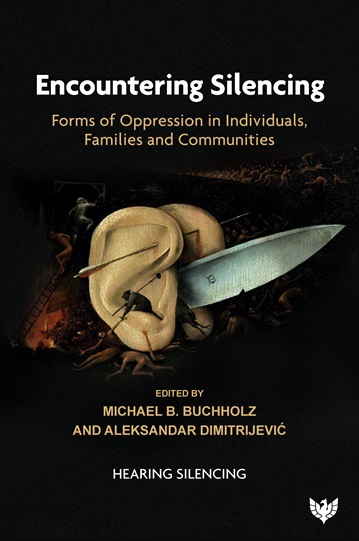Encountering Silencing: Forms of Oppression in Individuals, Families and Communities

Book Details
- Publisher : Karnac Books
- Published : 2024
- Cover : Paperback
- Pages : 272
- Category :
Psychoanalysis - Catalogue No : 97597
- ISBN 13 : 9781800132412
- ISBN 10 : 1800132417
Reviews and Endorsements
Following their brilliant book From the Abyss of Loneliness: to the Bliss of Solitude, in which they teased out the silence in which loneliness tends to germinate, the writers and co-editors Buchholz and Dimitrijević turn their magnifying glass and sound amplifiers into the eye of the storm and encounter silencing. Gathering an impressive list of contributors in their new co-edited book, Encountering Silencing, they examine meticulously the intricacies of active silencing of victims, perpetrators, and witnesses – the triad of participants in traumatic events – spreading from self-silencing to the denial and disavowal in socio-political groups and institutions of the truth about traumatic experiences. They do not shy away from facing the long tradition of silencing creative voices in the history of psychoanalysis as well. In this book, with the help of their contributors, Buchholz and Dimitrijević recognize that silencing is a human form of communication, inspired by the malignant consequence of power. They emphasize that it is the act of silencing and not the trauma per se that leads to emotional suffering and mental pain. This book does more than paint the roadmap of the processes and mechanisms involved in silencing and its consequences so we can recognize them as clinicians. It is also an invitation for all of us to sharpen our skills and expertise and nurture the courage that is needed in the important battle against acts of silencing. At the end of this book, I was left with the sensation that there is already another book in the making by this duo, a book about power that I'm already eager to read.
Ofra Bloch, psychoanalyst and filmmaker
There are few innovative concepts in psychoanalysis these days. The active, mostly unconscious intrapersonal or social imposition of silence, preventing giving voice to experience, charts a fresh and essential course through clinical and societal experience. This fascinating book explores in a multifaceted way perhaps the most fundamental of psychoanalytic ideas – why is the expression of experience in words so close to the core of what is uniquely human, and what happens when forces combine to prevent full manifestation of experience? The editors bring together some of the most sophisticated writers in our discipline to re-explore core psychoanalytic ideas through this innovative lens. The result is an outstanding, highly original, and immensely valuable collection of perspectives on what may be one of the most important ideas in contemporary psychoanalysis. A major book that is likely to become a classic contribution.
Peter Fonagy, OBE, FMedSci, FBA, PhD, Professor of Contemporary Psychoanalysis and Developmental Science, UCL; Chief Executive, Anna Freud National Centre for Children and Families, London
The editors and authors of this fabulous book complement the psychoanalytic focus on the intrapsychic dialectics of experiences included and excluded from consciousness with a focus on collective processes of experiences included and excluded from public discourse. They discuss both small (psychoanalytic associations) and large “groups" (subcultures, entire societies). The book is a crucial contribution to connecting psychological with cultural and social analyses. This volume will inspire all readers interested in understanding the psychology of collective emotions and memories.
Tilmann Habermas, Professor of Psychoanalysis, Goethe-Universität Frankfurt Am Main, Germany
In short, I am convinced that the originality, range, accuracy and seriousness that characterize all the contributions in this book are of great benefit to systemic psychotherapists in their topicality and expertise. I personally read it as an indispensable contribution to the further development of "our" theoretical and practical self-image. [...] This book is written for you, you young people, those who are young at heart and passionate thinkers! You will be thrilled.
Evelyn Niel-Dolzer, Buchrezension, August 2024 (translated from the original German)
In the first two chapters of the book, Michael Buchholz and Aleksandar Dimitrijević, partly with the assistance of literary scholar Hans-Christoph Ramm, explore "silencing" processes from the perspectives of victims, perpetrators, and witnesses in specific past or present political constellations. On the other hand, with a stylistic assurance worthy of their sources, the authors narrate and comment on stories of silencing from literature ranging from Ovid and British classics to contemporary Nigerian works. In doing so, they offer the reader an almost synesthetic experience, which evokes associations for me with the wisdom of Forrest Gump's mother ("Life is like a box of chocolates. You never know what you're gonna get.") and with the Pavlovian conditioning paradigm. Just as a child opens a candy wrapper in joyful anticipation of the sweetness, their mouth already watering at the sound of the paper crunching – I felt similarly whenever a paragraph sparked my anticipation of the detailed analysis of another literary work, full of curiosity about what awaits me this time.
Lutz Wittmann, PSYCHE, November 2025, DOI 10.21706/ps-79-11, (translated from the original German)

